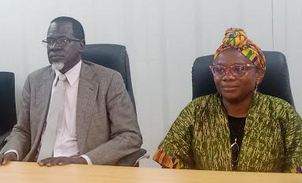The UN Women Deputy Country Representative in South Sudan, Rukaya Muhammed, has emphasized the importance of documenting women’s voices and ensuring their active participation in the country’s ongoing constitution-making process.
She made the remarks on Tuesday while handing over a donation of office equipment, including five laptops, 5 desktops, cabinets, and 50 boxes of printing paper, among others, to the National Constitution Review Commission (NCRC). She stressed that it is essential to ensure the permanent constitution reflects the aspirations and needs of women.
“It is a pleasure for me to stand here this morning at the premises of NCRC to deliver some equipment that will enhance the operational work of the commission. I think this is very critical,” she said. “We say that whatever is not documented, it is not done. We are at a critical point where there will be public consultations and civic education at various levels, and these discussions are very important and need to be documented.”
Muhammed emphasized the importance of documenting women’s voices and participation in the constitution-making process.
In March, the NCRC launched its civic education and public consultation campaign in Juba, an initiative meant to engage citizens across the country in the constitution-making process by raising awareness and gathering public input on key constitutional issues. However, the campaign activities have largely been confined to Juba due to insecurity and limited resources.
Meanwhile, NCRC Chairperson Riang Yier Zuor commended UN Women for the donation, saying the constitution making process requires a lot of equipment for documenting the views of the citizens.
“The constitution-making process is a very tedious process that will require a lot of documentation and recording. It will be a nationwide activity and, in each state, a team will be sent to conduct civic education and public consultations,” he said. “That team will go together with members of the secretariat who will be responsible for taking minutes of the proceedings, taking views of the public that will be used later on to generate the constitutional text. So, this exercise requires a lot of equipment.”
“Computers will be very useful because they will be used to record everything, and we appreciate UN Women for being with us in this process,” he added.




